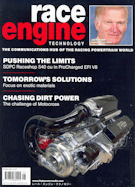Can someone please give me a clear explanation of the difference between power and torque?
When I have asked mechanics in the past, they immediately start muttering and are unable to explain it without resorting to "you know, torque is torque and not the same as power". They don't seem to know themselves, only that the bigger the number the better.
Also, why is it that diesels of a cubic capacity and power rating to a petrol engine, lets say both are 250 cu in, are far more "powerful" than the petrol engine of the same size?
Should say, that I bought the diesel Pajero as it produces more torque but less power than the petrol motor. Salesman was very adamant about me buying diesel due to
having better trade in value.
Thanks
Doug
When I have asked mechanics in the past, they immediately start muttering and are unable to explain it without resorting to "you know, torque is torque and not the same as power". They don't seem to know themselves, only that the bigger the number the better.
Also, why is it that diesels of a cubic capacity and power rating to a petrol engine, lets say both are 250 cu in, are far more "powerful" than the petrol engine of the same size?
Should say, that I bought the diesel Pajero as it produces more torque but less power than the petrol motor. Salesman was very adamant about me buying diesel due to
having better trade in value.
Thanks
Doug





![Drive[1]](smilies/0/0/5/4/3/6/images/smilies/drive[1].gif) Runner-Paj; '95 NJ SWB 2.5L TD GL J-Top, low kms Project-Paj; '92 NH SWB 3.0L V6 GLS Hardtop Triple-pack, also low kms. Donor Paj; '92 NH SWB 3.0L V6 GLS Hardtop Triple-pack, with some parts & goodies to go onto other GLS.
Runner-Paj; '95 NJ SWB 2.5L TD GL J-Top, low kms Project-Paj; '92 NH SWB 3.0L V6 GLS Hardtop Triple-pack, also low kms. Donor Paj; '92 NH SWB 3.0L V6 GLS Hardtop Triple-pack, with some parts & goodies to go onto other GLS.![Help[1]](smilies/0/0/5/4/3/6/images/smilies/help[1].gif) "
"
![Lol9[1]](https://www.pajeroforum.com.au/core/smilies/0/0/5/4/3/6/images/smilies/lol9[1].gif)

Comment